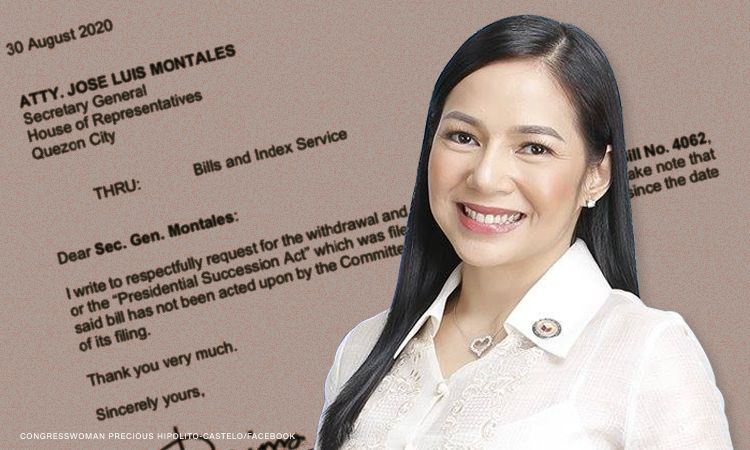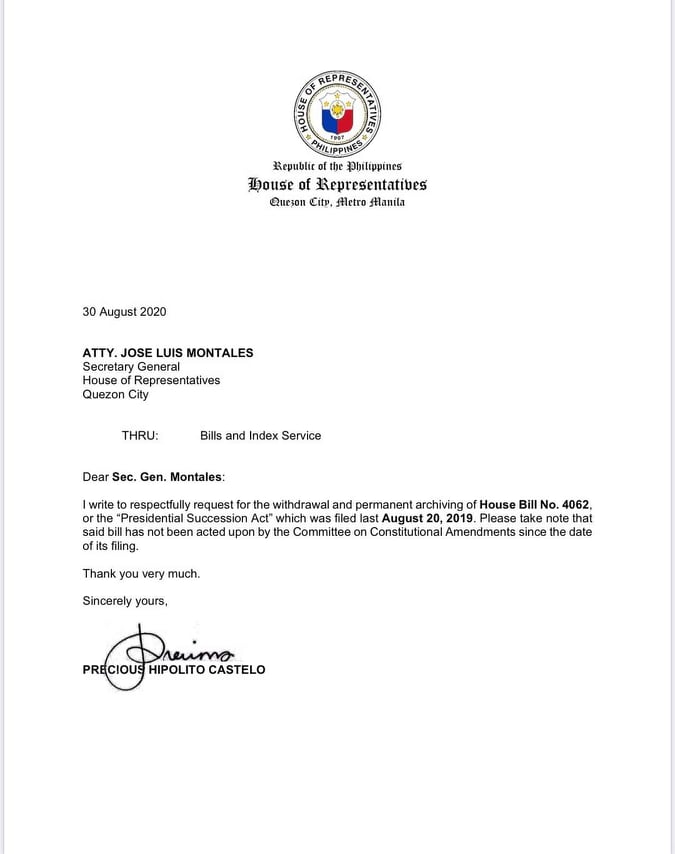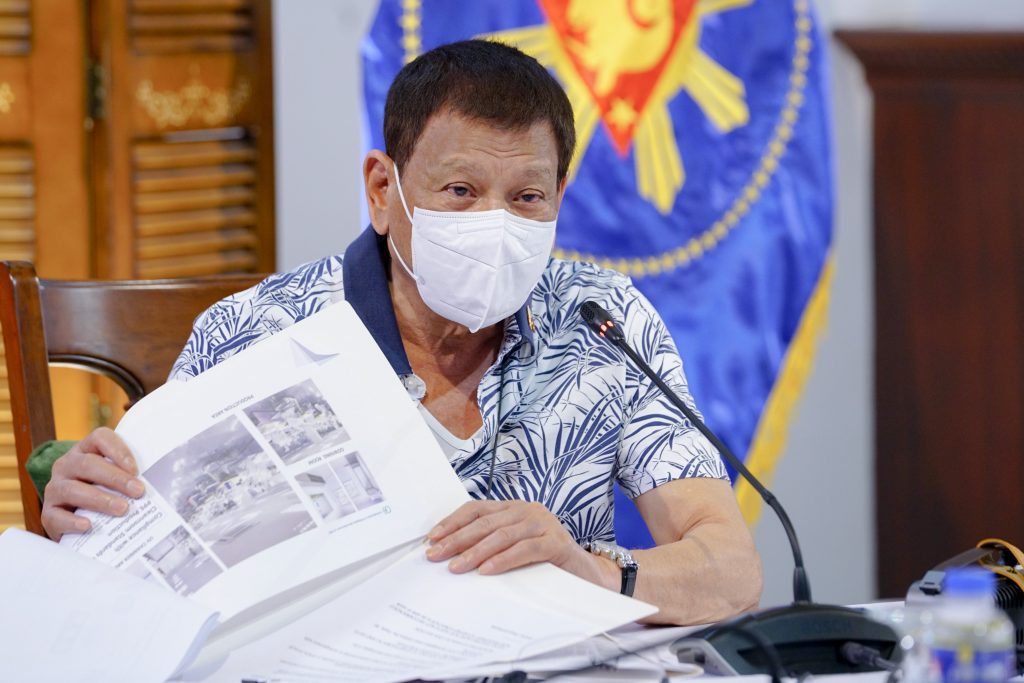
During the First Regular Session of the 18th Congress, House Bill 4062 or what is called the Designated Successor Bill, was introduced by Rep. Precious Hipolito Castelo of the Second District of Quezon City.
The former film and television actress (and newscaster) turned congresswoman was said to have, in part, based her bill on the Netflix TV series “Designated Survivor,” a three-episode movie starring Kiefer Sutherland as U.S. President Tom Kirkman. Sen. Panfilo Lacson said as much in one of his interviews last year.
In the movie, Kirkman sat as the low-level Housing and Urban Secretary until a tragic terrorist attack during the State of the Union Address claims the lives of the President, Vice-President and all those in the line of political succession.
Without any high-level experience in the White House, Kirkman is now thrust into the grueling world of the POTUS.
HB4062: Designated Successor Bill
HB 4062 aims to authorize the President to designate a successor should such a tragedy happen in the Philippines, or if those in the line of succession are deemed unfit to lead the country.
In its Explanatory Note, HB 4062 says: “While the strongest and strictest security measures have always been implemented and enforced during SONA (State of the Nation Address), There is always a chance, however slim, that a tragedy can happen. It is true that the Philippine Constitution provides for a line of succession in case of incapacity, death, resignation, or removal of the President from office. The line of succession follows the order of the Vice President, Senate President, and the Speaker of the House of Representatives.
“However, in the unlikely chance that all of these officials become unavailable to fill the role of the President, our supreme law does not provide a rule. During SONA or any other assembly where these officials are gathered, the probability of this happening becomes greater.”
Days later, Sen. Lacson filed a similar Senate bill—SB No. 982—on Aug. 28 last year.
Under the 1987 Constitution, Art. VII, Sec. 8, the line of succession reads as follows: “In case of death, permanent disability, removal from office, or resignation of the President, the Vice-President shall become the President to serve the unexpired term. In case of death, permanent disability, removal from office, or resignation of both the President and Vice-President, the President of the Senate or, in case of his inability, the Speaker of the House of Representatives, shall then act as President until the President or Vice-President shall have been elected and qualified.
“The Congress shall, by law, provide who shall serve as President in case of death, permanent disability, or resignation of the Acting President. He shall serve until the President or the Vice-President shall have been elected and qualified, and be subject to the same restrictions of powers and disqualifications as the Acting President.”
In a nutshell, if the President is unfit to rule by reason of illness or death, the Vice President must take his place as Acting President to serve the unexpired term. If any tragedy should befall the Acting President, Congress must, by law, provide who must take the latter’s place.

The President’s health
Talks of succession is rife on account of rumors that Pres. Rodrigo Duterte is not in the best of health. Weeks of online chatter placed Duterte as having been in and out of Singapore for treatment.
Speculations reached fever pitch on social media soon enough, prompting the President’s sidekick, Sen. Bong Go, to offer “proof of life” in terms of “selfies”. Many, however, found proofs of alteration in the said photographs.
Section 12 of Article VII of the Constitution is clear on the matter of the President’s health:
“In case of serious illness of the President, the public shall be informed of the state of his health. The members of the Cabinet in charge of national security and foreign relations and the Chief of Staff of the Armed Forces of the Philippines, shall not be denied access to the President during such illness.”
The rumors were, in a way, proven true when Malacanang’s doctor pointed to Duterte’s Barrett’s esophagus ailment “nearing Stage One cancer”.
Barret’s esophagus is an ailment that damages the lining of the esophagus resulting from stomach acid reflux.
The Palace, on the other hand, downplayed the diagnosis as having been given “long ago”.
In one Inquirer interview, Malacanang spokesperson Harry Roque said, “So you’re talking of a medical advice that happened many years ago, even prior to the presidency. And I think the reason why the President stopped drinking is to prevent it from developing into stage 1 cancer. That is the context of what the President said.”
The President also admitted to Buerger’s disease (a condition affecting blood vessels of mostly the arms and legs which leads to swelling, blood clots and eventual damage and death of living tissues) and a long-standing spinal injury which he got from a motorcycle accident seven years ago. Duterte is now 75.

Legislation: fiction or fact?
Recent calls for Vice President Leni Robredo to take over Duterte’s position has raised questions as to the relevance of the Designated Successor Bill filed by Rep. Castelo last year.
Rep. Castelo, on the other hand, sought for the withdrawal of the said bill since it has not been acted upon by Congress from the day it was filed.
Public suspicion as to how the bill might be used by unscrupulous implementers of the law to keep VP Robredo from taking office put the piece of legislation in serious doubt of its real intention, more so now that the President is feared to be losing a grip on his health.
The 1987 Constitution is clear on who must succeed the President on the occasion that he is rendered indisposed to fulfill his duties.
While the threat of terrorism poses a clear and present danger, the presumption that a terrorist act of such horrendous proportions would cut down all those in the line of succession is, by the government’s own words, very “slim”.
And if Sen. Lacson’s words prove true in one of his interviews that the bill was somehow based on the movie “Designated Survivor,” then Hollywood fiction may have been the basis of the said piece of legislation than hard facts.
Which brings us to the question: are our legislators so ill-equipped in gathering, verifying and understanding intelligence reports that they have to rely on television fiction to shape our legislation?
Fiction, for it to hit the box office, is largely shaped by a heightened amount of conflict. Legislation, on the other hand, for it to be effective, should leave us protected, not entertained.
Thus, facts are not only necessary, they must underpin every piece of legislation crafted to safeguard the people.
Everything else is Netflix.
Joel Pablo Salud is an editor, journalist and the author of several books of fiction and political nonfiction. The views and opinions expressed in this article are those of the author and do not necessarily reflect the official editorial position of LiCAS.news.
Source: Licas Philippines
0 Comments